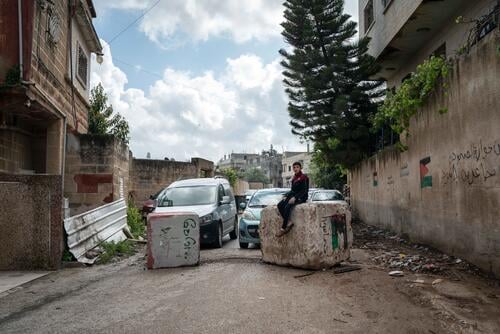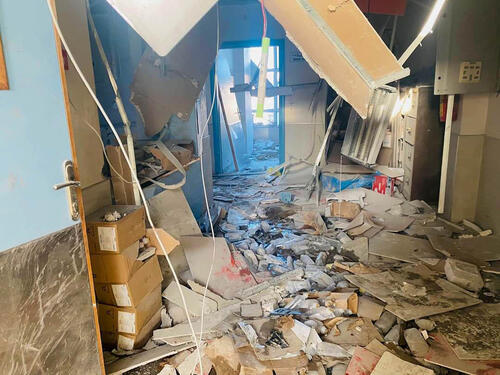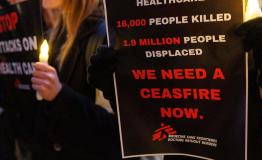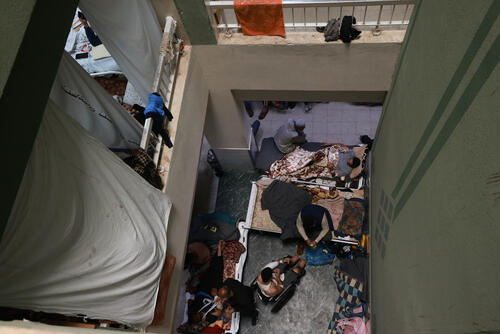As Israeli settlements grow throughout the West Bank, incidents involving settlers are at an all-time high. With Israeli forces failing to prevent violence and sometimes enabling it, Palestinians are more exposed to brutality than ever.
Yasser Abu Markhiyeh’s daughter, Jana, was two and a half years old when stones struck her face and legs. Jana was sitting on her father’s lap while he sipped his coffee on the terrace of their home in the West Bank city of Hebron. Then, Israeli settlers from nearby houses began to hurl stones towards the 51-year-old Palestinian man’s house from the street.
Médecins Sans Frontières (MSF) psychologists help Yasser and Jana cope with the episode and the recurring attacks that they face in their home due to its proximity to settler houses.
Now aged seven, Jana has strabismus (a condition in which both eyes do not look at the same place at the same time). The condition required several rounds of surgery and will require at least one more in coming years.
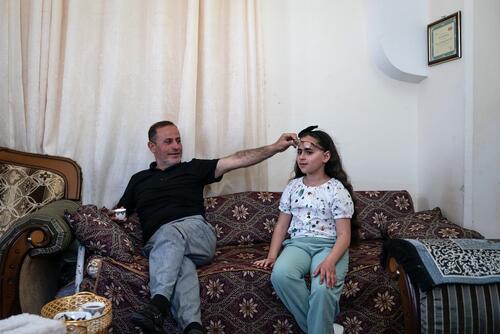
Yasser and Jana’s neighbourhood of Tel Rumeida is a particularly settler-heavy area inside a part of Hebron known as H2, an enclave under Israeli authority, and home to approximately 700 settlers who live in close proximity to Palestinian residents.
Shuhada street, in the nearby Old City, reflects the impact of the settlements on H2. Once a vibrant commercial hub, it slowly morphed into a ghost town as checkpoints were established, entry permits to enter the area became mandatory for Palestinians, and shops were closed one by one.
H2 is symptomatic of a trend affecting the entire West Bank: as the number of settlers in that area rose from 183,000 in 1999https://peacenow.org.il/en/settlements-watch/settlements-data/population to 465,000 today (excluding 220,000 in East Jerusalem), so did the number of Israeli soldiers assigned for their protection, as well as the number of restrictions their presence implies for Palestinians’ day-to-day lives.
This dual settler and military presence in turn creates incidents, often violent, in which Palestinians invariably lose, with consequences ranging from property damage to death. The increase in settlements in the West Bank caused this so-called settler violence to steadily increase in recent years, from 195 injuries in 2008, to a record 304 injuries in 2022, per the UN’s Office for the Coordination of Humanitarian Affairs (OCHA)ochaopt.org/data/casualties.
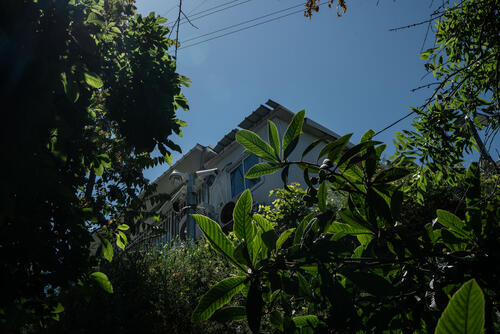
“We see a huge incidence of settlers attacking people in these areas during our work providing medical and mental health services in the area, particularly near settlements such as H2,” says Mariam Qabas, MSF health promotion supervisor in Hebron.
“Between checkpoints, verbal and physical harassment, imprisonment, property damage and movement restrictions, Palestinians face violence not just from settlers, but also from Israeli forces,” she says.
Together, these components create mental health disturbances that lead to “a lot of post-traumatic stress disorder cases, general anxiety, depression, kids who strongly fear going to school, and much more.”
Mariam, 56, was once targeted by settlers who threw stones at her and another MSF staff member as they were waiting outside a patient’s home in H2. She recalls feeling helpless and frustrated for her patients.
“How can we support these people when we can’t even protect ourselves from these attacks, even with the MSF vest?” says Mariam.
Between checkpoints, verbal and physical harassment, imprisonment, property damage and movement restrictions, Palestinians face violence not just from settlers, but also from Israeli forces.Mariam Qabas, MSF health promotion supervisor in Hebron
Mariam recalls that once, after a group of settlers removed the number plate from an MSF car in Hebron, she argued with them to get the plate back. A soldier standing nearby pointed his gun at her and the team, and they had to leave.
Rage and rampage in the West Bank
In the area surrounding the northern West Bank city of Nablus, settlements illegal under international law were established on hilltops in the rural areas near the city. There, too, incidents reached record levels in 2022, while 2023 has brought one of the most dramatic settler incursions yet.
In the nearby town of Huwara, hundreds of settlers, some carrying knives and guns, went on a rampage in February 2023 after a Palestinian gunman fatally shot two settlers. The raid led to indiscriminate violence that left one civilian dead, over one hundred people injured and a lot of material damage to Palestinian property, ranging from broken windows to burnt cars.
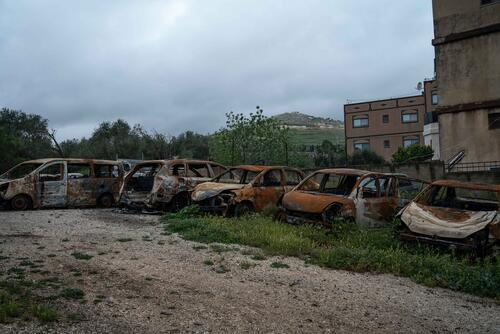
Hussam Odeh is from a newer generation and doesn’t remember a time without an established settler presence nearby. He lives just off Huwara’s main street, where traffic increased significantly in recent months after Israeli forces used large cement blocks to better control access to the town.
Although just 15 years of age, Hussam is keenly aware of the power dynamics in the West Bank. From the window of his apartment, he can see soldiers on the roof of the building across the street, who use it as a vantage point over the town.
“We know them, and we can differentiate them,” he tells MSF staff, who visit his building to provide mental health support to his aunt and his younger cousins.
Hussam’s high school, Huwara Secondary Boys School, is particularly close to a settlement. In October 2022, as Hussam and his friends were playing soccer in the courtyard before first period, he began to hear shouting and screaming.
“We were told that settlers were attacking the school. They had guns and Molotov cocktails,” he says. The army eventually dispersed the settlers and sent everybody home, but two students were sent to hospital for injuries they sustained in the attack.
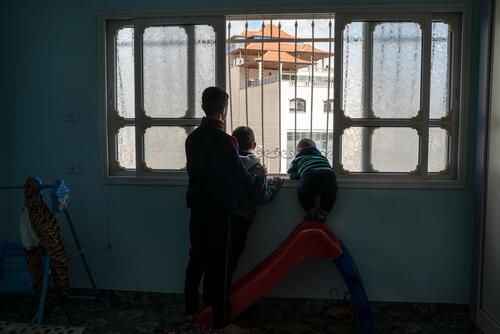
Mustafa Mlikat, a Bedouin man who recently moved to the nearby village of Douma from the Jericho area to escape settler harassment, also deplores the increased violence from settlers.
Though never pleasant, things were not as bad in the past, the 50-year-old herder says. He remembers when settlers from rural areas would give him or other Bedouins rides on their way into town. Then, settlers built a house next to his.
“They would harass us all the time... they built a house right next to us, they started harassing our sheep, they forbade us to use the land we used to let our sheep graze on.”
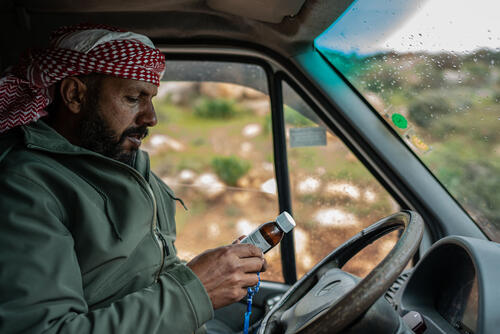
Bedouin communities are particularly vulnerable to settler violence because as herders their presence stands in the way of settlements in rural areas coveted by settler farmers.
“They want all the areas where the Bedouins are to be for the settlers. All the Bedouins are being targeted,” says Mustafa.
Yet after he built a house in Douma, Israeli soldiers destroyed it in February 2023, citing a lack of building permits as a reason. Amid the rubble of what was once his house, forced in a tent that will become unliveable in the summer months, he no longer knows what to do.
On a rainy April day, the tent’s fabric flaps loudly in the wind while Shireen and Mirella, two MSF mental health workers, use image prompts to help Mustafa’s daughter, Jinan, express the emotional impact of the destruction of her house.
“The mental health of Palestinians is affected not only by these manifestly traumatic events, but also by a constant state of alertness, preoccupation and lack of planning for the future that the occupation imposes,” says Mirella, MSF mental health activity manager in Nablus.
We feel the Israeli army follows some rules... Settlers are not bound by such rules, and if they become angry, who knows what they might do.Youssef*, a Palestinian from Nablus
Pressed between ever-expanding settlements whose occupants behave unpredictably, Youssef*, a Palestinian from Nablus, feels more comfortable facing soldiers than settlers.
“We feel the Israeli army follows some rules, at least the majority of it,” he says. “Settlers are not bound by such rules, and if they become angry, who knows what they might do.”
At 50, he has seen settlements expand and make his job as a driver harder as the number of roads accessible to Palestinians shrinks. He laments the status quo that prevails in the West Bank since the Oslo Accords of 1993. “The occupation is at the root of everything. Without it, there is no violence, no killings.”
*Name changed to protect identity
MSF has been present in the West Bank since 1988. In Nablus, we run a mental health project with outreach activities in Qalqilya and Tubas. We also run a mental health programme in Hebron city, medical services in H2, and basic healthcare in nearby Masafer Yatta via mobile clinics. A recently opened project in Jenin provides training for mass-casualty plans, emergency response and patient triage.



